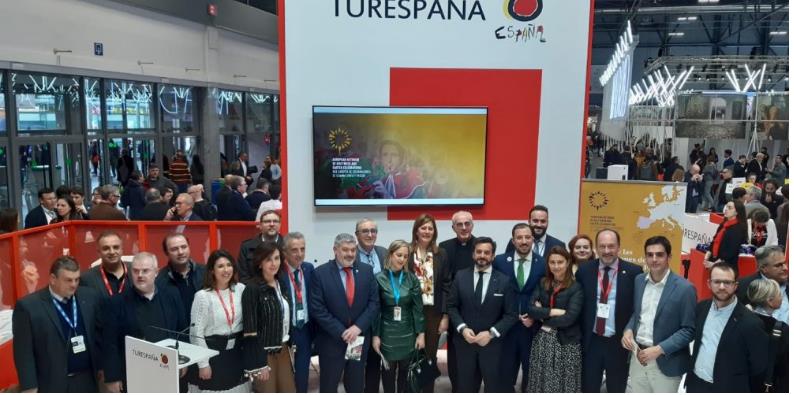At present, the route is made up of 18 European and national destinations and its objective is to become a European Cultural Itinerary
The Turespaña stand was the stage selected for the presentation of the European Network of Easter and Easter Celebrations. This network arises with the objective of preserving, protecting and disseminating the cultural heritage, both material and intangible, which are the celebrations of Holy Week and Easter of its 18 member destinations.
The presentation was attended by Ms. Rosario Andújar Torrejón, President of the European Network of Easter and Easter Celebrations, President of the Caminos de Pasión Association and Mayor of Osuna (Seville); Mr. Manuel Alejandro Cardenete Flores. Deputy Minister of the Ministry of Tourism, Regeneration, Justice and Local Administration of the Junta de Andalucía; Mr. Francisco Morales González, Deputy Mayor of Lorca and Delegated Councilor for Tourism; Mr. Emilio Bascuñana, Mayor of Orihuela (Alicante) and Ms. María Loureiro García, Mayor of Viveiro (Lugo) as representatives at the table as well as other authorities and delegates of institutions and organizations such as the Secretariat of State for Tourism, the Institute European Cultural Itineraries or mayors and managers of the participating municipalities.
The European Network of Easter and Easter celebrations is made up of the Italian Federico II Foundation, representing the municipalities of Palermo and Caltanissetta, of Sicily (Italy); the municipality of Birgu in Malta; the Lenten and Celebrations Commission for Holy Week in Braga, in Portugal; Representations of the Passion of Christ in Skofja Loka, Slovenia; the municipalities that are part of the Paths of Passion route, among which are Alcalá la Real in Jaén, Baena, Cabra, Lucena, Priego de Córdoba and Puente Genil in Córdoba and Carmona, Écija Osuna and Utrera in Seville. Also within the Spanish geography we find the municipalities of Orihuela in Alicante; Lorca in Murcia and Viveiro in Lugo.
Traditions that unite.
The current president of the European Network, Ms. Rosario Andújar, took the floor to explain how the idea of creating this network arises that what she seeks is to “conserve, protect and promote the cultural heritage, both material and intangible, which the celebrations entail Easter and Easter in these municipalities; improve heritage destinations and their natural and rural environment thus betting on redistributing tourism to other less crowded destinations with common characteristics contributing to the practice of more sustainable tourism; create cooperation networks with cultural and tourist agents that deepen and highlight the authenticity, uniqueness and social background of the destinations; encourage educational activities as well as promote research about these customs and traditions of their own ”.
In this regard, he highlighted how the work that has been done since its creation last March 2019 is also focused on presenting his candidacy as a European Cultural Itinerary. "This networking of the 18 destinations that currently make up the European Network of Holy Week and Easter Celebrations is a commitment to glocalization," said Andújar. A European network work in which thoughts are global but actions have a local impact. The need to find points of union between the different destinations and, in turn, highlight the uniqueness of each one of them makes this project an exciting challenge. Recognize the importance, at a social level, of these celebrations and how, thanks to them, the development of a territory takes place and its people were the message that was intended to be transmitted during the presentation.
All this, in addition, aware that the dissemination of these traditions are intended to give rise to the recognition of the uniqueness and differences of these destinations and that the activities to be carried out should focus on the commitment of cultural heritage as a tool for the seasonalization of tourism and tourism. redistribution of the flows as well as the commitment decided by the local communities and carriers of these traditions. The project website was officially presented and, in addition to the network, where more information can be found www.holyweekeurope.com




